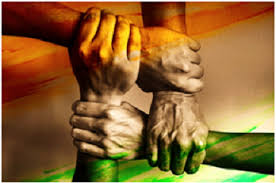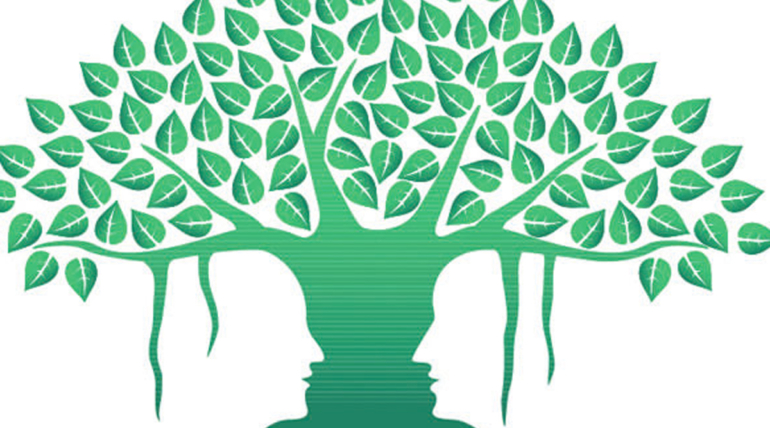
In an interactive session carrying Swami Vivekananda’s message to the world, “Frog of the well and Frog of the ocean” Kumari Sujatha, Prant Sanghathak, Andhra Pradesh and Secretary, Vivekananda Kendra Kanyakumari, took the floor and presented the story of utmost importance and wisdom. Sujatha ji walked the audience through Swami Vivekananda’s journey to the “The Parliament of the World’s Religions,” in 1893. The Parliament of the World’s Religions was an exposition that attempted at creating a global dialogue of faiths held in Chicago, the United States. She also spoke extensively about Swami Vivekananda’s proud representation of India and Hinduism at the fair. The conversation also touched on “What’s at stake,” “Reflections,” “Ek Bharat Vijayi Bharat,” and “Our turn now.”
To this day, Swami Vivekananda’s landmark speech at the World Parliament of Religions, in which he introduced Hinduism to America and argued for religious tolerance and an end to fanaticism, is what Americans most commonly recall about him. The most valuable message from the exposition, according to Sujatha ji, focuses on how Swami Vivekananda expressed his gratitude on behalf of the mother of all religions, the most ancient order of monks in the world, and the millions and millions of Hindus from all classes and sects.
He took great pride in stating that he belonged to a faith that has taught the world tolerance and universal acceptance. “We believe not only in universal toleration, but we accept all religions as true,” Swami Vivekananda. Sujatha ji further underscored the need for tolerance and acceptance in relationships. She said, one might think about putting up with a certain behaviour in a relationship, but if they can’t accept someone for who they are, things could get ugly. Tolerance doesn’t allow one to fully accept someone’s imperfections whereas acceptance is when they wholeheartedly accept the person for who they are. Thus, at the exposition, Swami Vivekananda established Hindu Dharma in terms of philosophy, ancestry, culture, inclusiveness, and universality.
On one of the days at the exposition, a speaker who spoke before Swami Vivekananda ended his address by saying, “Let us cease abusing one other,” and expressed his regret that there should always be so much variance. Swami Vivekananda carried the message forward and went on to explain the reason behind the variance in a tale.
In a well, lived a frog. For a very long period, it had resided there. Despite being born and raised there, the frog was very little. The frog regularly rid the water of all the worms and bacteria that lived there with vigour and that would be worthy of praise to contemporary bacteriologists. The frog continued in this manner and eventually grew quite sleek and fat. A different sea frog eventually arrived and fell into the well one day.
“Where are you from?” asks the well frog.
“I am an ocean creature,” replies the ocean frog.
“The ocean! What size is that?” enquires the well frog.
The well frog makes a tiny jump and asks, “Is it this big?”
“No, it is bigger,” the ocean frog chuckled.
“This big?” the well frog questioned after making a larger leap.
“No.” answers the ocean frog.
From one side of the well to the other, the well frog made a huge leap. “Is it the same size as my well?” the well frog questions.
“You are babbling nonsense when you compare the ocean to your well,” exclaims the ocean frog.
Therefore, “Nothing can be bigger than my well; you are a liar, get out of my well,” the well’s frog remarked.
After thoughtful scrutiny, Swami Vivekananda stated that the problem with what confines everyone limits their thoughts is “I am a Hindu. I am sitting in my own little well and thinking that the world is my well. The Christian sits in his little well and the whole world is his well. The Mohammedan sits in his well and thinks the whole world that.” He applauded America for the wonderful effort they made to tear down the walls of this little world and prayed that the Lord will support them in achieving that goal in the future.
He proposed that all sampradayas (or chains of disciplic succession) and panthas are simply alternative routes to the ultimate Ishvara as a solution to the problem. It is a vision-based philosophy and culture that can help harmonize differences or the consequences would be only bloodletting.
The following are other papers by Swami Vivekananda that Sujatha Ji urged the audience read:
Paper on Hinduism: 19 September 1893 – Gives a complete outlook on Hinduism.
Religion not the crying need of India, Buddhism the Fulfilment of Hinduism: 20, 26 September 1893
Concluding address: 27 September 1893
In his concluding address, Swami Vivekananda gave a beautiful analogy of a seed on evolution, she said. Citing what he said:
“The seed is put in the ground, and earth and air and water are placed around it. Does the seed become the earth, the air, or the water? No. It becomes a plant. It develops after the law of its own growth, assimilates the air, the earth, and the water, converts them into plant substance, and grows into a plant.
Similar is the case with religion. The Christian is not to become a Hindu or a Buddhist, nor a Hindu or a Buddhist to become a Christian. But each must assimilate the spirit of the others and yet preserve his individuality and grow according to his own law of growth.”
“Upon the banner of every religion will soon be written despite resistance: “Help and not fight,” “Assimilation and not Destruction,” “Harmony and Peace and not Dissension,” he says as he concludes his remarkable speech.
She further outlines Swami Vivekananda’s path ahead to safeguard our national welfare on “Ek Bharat Vijayi Bharat.” “India must gather up of its scattered spiritual forces. India must be a union of those whose hearts beat to the same spiritual tune.” In her final remarks on “Our turn,” she discusses how each of us can help India progress as “Ek Bharat Vijayi Bharat” by doing our smallest possible share of what it takes to bring all the streams from the state together and unite them to form an ocean.
-By Aditi Warnoolkar


